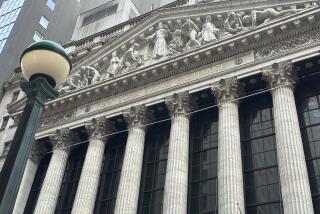Stocks Slip in Quieter Trading; Bond Yields Off
- Share via
Market Overview
Highlights of Friday’s market activity, compiled from Times staff and wire reports:
* Blue chips slid lower, dragged down by banking and financial service stocks, but trading was calmer after Thursday’s dive on inflation jitters.
* Treasury bond yields retreated as inflation worries continued to dominate trading.
* The dollar closed lower against major foreign currencies as dealers turned their attention to developments in Europe’s economy.
Stocks
The market traded narrowly for most of the session as dealers, wary after a 34-point drop on Thursday tied to inflation jitters, were reluctant to put much cash to work ahead of the weekend.
The Dow Jones average fell 4.98 to 3,443.01, ending 5.82 higher for the week. Declining issues outnumbered advancers by about 9 to 8 on the New York Stock Exchange. Big Board volume totaled 252.91 million shares, down from 293.92 million on Thursday.
“There’s enough cash to keep it from really collapsing, but there aren’t enough investment opportunities to move it a lot higher,” said Charles Clough, chief investment officer at Merrill Lynch.
The market had little reaction to two reports by the Federal Reserve. The Fed said U.S. industrial production picked up 0.1% in April.
The Fed also reported that U.S. industry operated at 81.4% of capacity in April, unchanged from a revised figure for March. Capacity utilization was initially pegged at 79.9% in March. Both reports indicated a slow but steady improvement in the economy.
* A number of Dow components were big losers, including General Motors, down 1 to 39 1/4; Sears, off 1 1/8 to 53 1/8, and Caterpillar, off 5/8 to 69 5/8.
* Big bank stocks fell for the second consecutive session. Chase Manhattan ended down 7/8 to 29, Chemical Bank was down 5/8 to 36 5/8, and Citicorp was off 3/4 to 26 3/4. Bank stocks lost ground Thursday after the big drop in bonds and rise in interest rates.
* The stocks of regional banks also fell after Donaldson, Lufkin & Jenrette Securities downgraded them, citing inflation concerns. Nationsbank fell 2 1/8 to 46, First Union fell 1 1/2 to 43 1/2, and National City Corp. declined 3/4 to 47 7/8.
* Royal Dutch Petroleum led the most-actives on the NYSE and was up 1/4 to 90 5/8, on huge volume of 45.21 million shares. The action in Royal Dutch was tied to an upcoming dividend payment by the company.
* Andrea Electronics soared 7 1/2 to 66. The company, which develops electronic communications systems, declared a 400% stock dividend, payable June 14 to shareholders of record May 21.
* Centex, a housing construction company, dropped 1 5/8 to 29 1/4 after Kidder, Peabody & Co. downgraded the stock.
* Gold stocks were mixed after big run-ups Thursday based on gains in gold prices. Newmont Gold was down 7/8 to 42 3/8, but Battle Mountain Gold gained 3/8 to 8 5/8.
Overseas, Tokyo’s 225-share Nikkei average fell 58.63 points to 20,474.15, and Frankfurt’s 30-share DAX index lost 5.28 points to end the week at 1,634.51. In London, the Financial Times 100-share average slipped 2.3 points to close at 2,847.0.
Credit
The mixed performance came as this week’s reports of rising consumer and producer prices gave rise to speculation that the Federal Reserve may consider raising interest rates to curb inflation.
While many bond market participants don’t believe that the central bank is prepared to push up interest rates anytime soon, the sentiment nevertheless hurt shorter-term maturities on Friday.
Higher interest rates would hurt prices at the short-end of the Treasury market the most, since the central bank sets monetary policy by manipulating rates of shorter-term maturities. Higher interest rates in the economy hurts the value of existing securities, tending to push down their price.
Longer-term bonds, whose value is eroded the most by inflation increases, could benefit from a less-inflationary Fed policy.
By Friday’s close, the price of the Treasury’s bellwether 30-year bond yield fell to 6.93% from the previous day’s 6.95%, pushing up its price, which moves in the opposite direction, 7/32 point, or $2.19 per $1,000 in face amount.
In remarks apparently designed to soothe battered financial markets, President Clinton told a news conference that longer-term inflation remained subdued despite this week’s reports of an unexpected surge in prices last month.
But the bond markets failed to recover on his words, which came after a morning report of industrial production that further reinforced inflation fears.
The federal funds rate, the interest on overnight loans between banks, fell to 2.938% from 3% late Thursday.
Other Markets
Currency traders said the day’s session offered little news to encourage buying of the dollar. The Fed’s industrial production report did not offer any encouragement to traders, said Bob Near, a vice president at Bank of New York.
Next week’s vote in Denmark on the Maastricht treaty for European unity and the meeting of Germany’s Bundesbank are developments with the potential to create turmoil in currency markets.
“The dollar is just sidelined. Europe is running the show now,” said Near.
In New York, the dollar settled at 1.602 German marks and 110.80 Japanese yen, down from 1.615 marks and 111.80 yen, respectively, on Thursday. The British pound was quoted at $1.539, up from $1.523 late Thursday.
On the Commodity Exchange in New York, gold for current delivery fell $1 an ounce to $367.70, a day after the metal surged $7.50 an ounce on inflation concerns. Silver slipped 1.6 cents to $4.444 an ounce.
Oil futures continued their slide on the New York Mercantile Exchange amid ample supply. Light, sweet crude oil for June delivery fell 30 cents to $19.48 a barrel.
Market Roundup, D4
More to Read
Inside the business of entertainment
The Wide Shot brings you news, analysis and insights on everything from streaming wars to production — and what it all means for the future.
You may occasionally receive promotional content from the Los Angeles Times.










